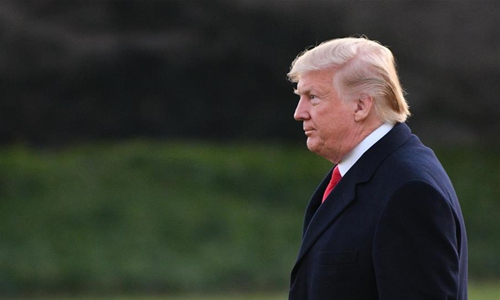HOME >> OPINION
Impeachment shows hypocrisy of partisan politics
Source:Global Times Published: 2019/12/19 22:08:40

US President Donald Trump leaves the White House in Washington D.C. December 18, 2019. The US House of Representatives passed the impeachment against Donald Trump on Wednesday. Photo: Xinhua
The US House of Representatives on Wednesday voted for two articles of impeachment against President Donald Trump. The outside world was strongly impressed by the following two points. First, the votes were largely split along party lines, with only three Democrats joining Republicans to vote "no." Second, the impeachment has almost zero chance to be approved in the Republican-controlled Senate.The US has launched the most frequent impeachments among major Western capitalist countries. With the involvement of personal grudges and partisan struggles, the impeachments have led to negative perceptions of Western-style democracy. This has seriously eroded some people's belief that US-style impeachment is a "manifestation of democracy."
Comments on the impeachment made by prominent Democrats and Republicans were poles apart, but all sounded just and upright. However, what lies beneath are political calculations for their own party. Political hypocrisy has become legitimate and been brought into the open in the US. No politicians would be ashamed of making false statements for their own interests.
One could imagine how adept these American politicians will be when they apply such political skills in dealing with foreign relations. Many of them are good at packaging interests as delivering justice. This has become a habit of them or considered a rule.
When the US Congress passed the Hong Kong Human Rights and Democracy Act and Uyghur Human Rights Policy Act, when US senior officials delivered a radical and extreme China policy speech, when they took action against China's interests under high-sounding excuses, how can we count on them to proceed from international law and justice and have goodwill toward China-US relations as well as the Chinese people?
The impeachment of Trump reflects the true face of American politics. Institutional flaws of Western-style democracy in recent years have increasingly been activated and expanded. The US is becoming growingly "extreme" be it in domestic politics or on global stage. Other mainstream Western countries, to varying degrees, are "Americanized."
Western countries such as the US used to act as stabilizers of the international order, but growing political polarization is turning them into a new source of instability in the world. Spillover from the US situation is inevitable.
The US media also clearly divide in the partisan struggle over the Trump impeachment. The attitudes of these media toward foreign countries are similar to those of US political parties. It's said the US media are "independent," but their performance in fact is far from neutral and objective.
We can hardly expect such US media to report on China based on rationality and facts. "Snubbing facts and prioritizing stance" is infiltrating US politics and its inertia is enough to influence the attitude of American public opinion toward China.
To deal with a US that is undergoing domestic struggles, the Chinese people should have more patience and prepare for uncertainties. The US is the only superpower. We have no other choice but to cope with challenges from the US.
Posted in: EDITORIAL